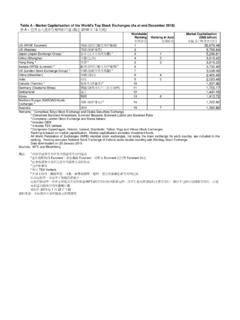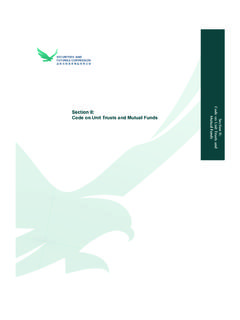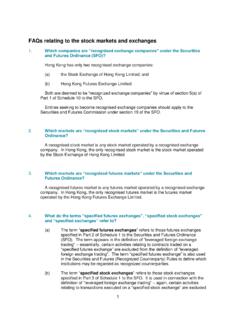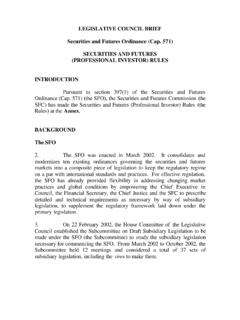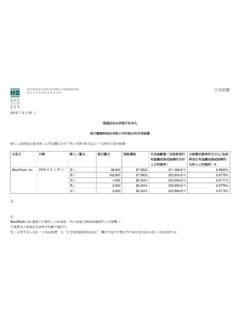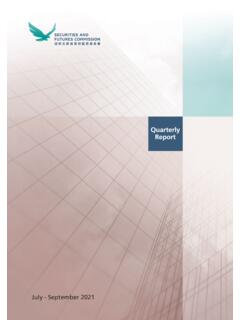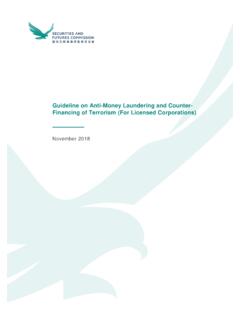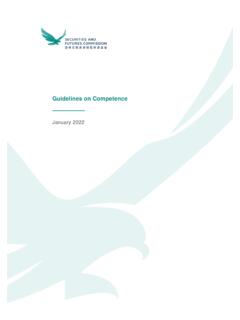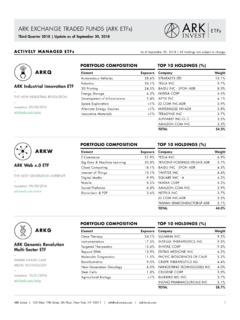Transcription of Exchange Traded Funds and Listed Funds
1 1 Frequently Asked Questions Exchange Traded Funds and Listed Funds This FAQ is prepared by the Investment Products Division and aims to provide basic information to market practitioners in respect of Exchange Traded Funds ( ETFs ) and Listed Funds , which are subject to the SFC Handbook for Unit Trusts and Mutual Funds , Investment-Linked Assurance Schemes and Unlisted Structured Investment Products (the Handbook ), including the Code on Unit Trusts and Mutual Funds ( UT Code ). Applicants are encouraged to contact the relevant case team in the Investment Products Division of the Securities and Futures Commission (the SFC ) if in doubt on any specific issues arising from the application/interpretation of the Handbook or this FAQ. Please note that each application for authorization is considered on a case-by-case basis.
2 The information set out below is not meant to be exhaustive. This FAQ may be updated and revised from time to time. This FAQ is only for general reference. Compliance with all the requirements in this FAQ does not necessarily mean an application will be accepted or authorization will be granted. The SFC reserves the rights to exercise all powers conferred under the law. Note: For ease of reference, collective investment schemes that are generally known as unit trusts or mutual Funds are referred to as Funds in the following FAQ. Question Answer Authorization of ETFs/ Listed Funds 1. Are the participating dealers ("PDs") of ETFs obliged to process subscription and redemption orders from third party investors? An efficient creation/redemption mechanism is key to an effective arbitrage/pricing mechanism which enables an ETF to trade at a market price close to its NAV.
3 Chapter of the UT Code provides that suspension of dealings may be provided for only in exceptional circumstances, having regard to the interests of holders. As such, the SFC would generally seek to require the PDs to process creation/redemption requests from third party investors save for exceptional circumstances, such as: 2 Question Answer suspension of dealing or determination of NAV of the ETF; where in the opinion of the manager, acceptance of the application will have an adverse effect on the ETF; suspension of trading on any of the shares constituting the relevant index basket; the ETF is not able to acquire further investments due to trading restrictions/limits in the market; or acceptance of the application will be in breach of laws or regulations or internal compliance or control requirements of the PDs which are for the purpose of ensuring compliance with laws or regulations.
4 The procedures/conditions in respect of the creation/redemption mechanism should be clearly disclosed in the ETF s prospectus/constitutive documents. In particular, any restrictions in creation/redemption of units and the circumstances under which investors orders may be refused should be prominently disclosed in the prospectus/constitutive documents. In addition, any fees and charges incurred by the PDs in executing investors orders or any factors which may reduce the amount of redemption proceeds to investors should also be clearly disclosed in the prospectus. Consultation with the Investment Products Division is encouraged if in doubt with the specific circumstances. 2. What is the key responsibility of an ETF manager regarding the pricing/arbitrage mechanism of the ETF? The overall responsibility of an ETF manager is to manage the ETF in the exclusive interest of investors, including the duty to closely monitor the operations ( pricing/arbitrage mechanism) of the ETF.
5 For instance, should an ETF trade at a substantial premium/discount to the NAV, the manager should investigate the matter and take appropriate action promptly. 3 Question Answer 3. Who would be eligible to manage an SFC-authorized physical A-share ETF through the Renminbi Qualified Foreign Institutional Investor (RQFII) scheme ? Under section 4 of the SFO, the SFC is to provide protection for members of the public investing in or holding financial products. Under section 104(5) of the SFO, the SFC is duty bound, in its authorization of collective investment schemes, to refuse authorization where it is not satisfied that the authorization is in the interest of the investing public. Under Chapter of the UT Code, every collective investment scheme for which authorization is requested must appoint a management company acceptable to the SFC.
6 In assessing acceptability, the SFC will take into consideration, amongst others, the management company s operational experience, infrastructure, systems and capability necessary for the smooth and efficient management and operation of the product proposed. Under current Mainland rules and regulations, only those SFC-licensed management companies who have RQFII licences and quotas are eligible to launch RQFII physical A-share ETFs in Hong Kong. RQFII physical A-share ETF is the first RMB physical A-share ETF issued outside mainland China that seeks to track an A-share index by channelling the RMB raised outside mainland China through the RQFII quota to directly invest in a portfolio of A-shares in the Mainland market which replicates the performance of the underlying A-share index. Given that RQFII physical A-share ETF is in its initial stage of development, the SFC has to be satisfied for the purpose of investor protection that in addition to handling the cross-border nature of this product, the management company has the operational experience, infrastructure, systems and capability to implement the relevant physical index replication strategies of an A-share index in the Mainland in a smooth and efficient manner.
7 In this regard, the experience and expertise of the management company s Mainland parent company in managing and operating physical A-share ETFs Listed and Traded on the Mainland stock exchanges and the related physical index replication strategies are important as the management company could tap into its Mainland parent company s relevant infrastructure and expertise to support its management and operation of the RQFII physical A-share ETF in Hong Kong. In view of the novelty and the technical complexity of RQFII physical A-share ETF and in the interests of protecting investors as well as Hong Kong Listed market s 4 Question Answer integrity and order, at the initial stage of development of the RQFII physical A-share ETF, the SFC would require the management company of such ETF to meet all the following key criteria in assessing the acceptability of the management company: the management company is licensed by the SFC for Type 9 regulated activity with sufficient experience in managing public Funds ; the management company has a valid RQFII licence from China Securities Regulatory Commission.
8 The Mainland parent company of the management company has sufficient experience and expertise in managing and operating physical A-share ETFs Listed and Traded in the Mainland; the management company has in place the necessary operating systems for smooth and efficient cross border money-flow, creation/redemption and operation, and there is a smooth and efficient use of its Mainland parent company's expertise and systems, to enable the ETF's operations in the A-share market to support a Listed and daily Traded product in Hong Kong which directly invests and operates in the Mainland A-share market; the management company s Mainland parent company must have good standing and a good track record, considerations to be taken into account include whether there are records of past disciplinary actions or proceedings and such other similar or relevant matters in the past 5 years which may reasonably affect its good standing and competence; and the necessary RQFII quota granted by State Administration of Foreign Exchange .
9 The SFC will keep in view the above criteria as the RQFII physical A-share ETF market in Hong Kong further develops. 4. Can an RQFII management company manage an SFC-authorized RQFII physical A-share ETF if it does not have a Mainland parent company with the relevant experience and expertise in, and the First and foremost, a management company of an SFC-authorized RQFII physical A-share ETF is required to meet all of the criteria and requirements set out in Chapter 5 of the UT Code and FAQ 3. 5 Question Answer necessary infrastructure and systems for, managing and operating physical A-share ETFs in the Mainland as required by FAQ 3? In all cases, as explained in FAQ 3, the management company must have sufficient human and technical resources and capability plus adequate infrastructure, systems, operational experience and processes, controls and procedures in place to the satisfaction of the SFC, in order to ensure the smooth and efficient management and operation of the RQFII physical A-share ETF.
10 Subject to the foregoing, where the management company does not have a Mainland parent company with the qualifications as required by FAQ 3, the following additional minimum requirements, subject to any additional requirements required by the SFC as the circumstances may warrant in the interest of market order and investor protection, will apply: the RQFII physical A-share ETF must adopt a full physical replication strategy and no representative sampling should be conducted; the management company must have at least one key personnel with at least 2 years physical A-share ETF portfolio management experience; the management company must retain a reputable Mainland, Hong Kong or international firm acceptable to the SFC as its investment adviser for at least 1 year after listing of the RQFII physical A-share ETF. The investment adviser must be of good repute and have solid experience and good track record in managing ETFs in Mainland, Hong Kong or other major ETF markets.

